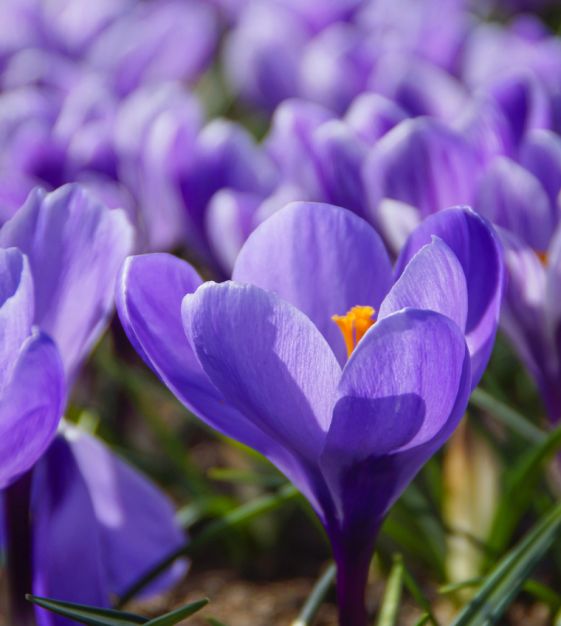-
- Website Specials
- New for 2025!
- Tulips
- Narcissi
- Allium
- Anemone blanda
- Brodiaea
- Camassia
- Chionodoxa
- Corydalis
- Crocus
- Eranthis
- Eremurus
- Erythronium
- Fritillaria
- Galanthus
- Geranium
- Gladiolus
- Hyacinths
- Hyacinthoides
- Ipheion uniflorum
- Dutch Iris
- Rock Garden Iris
- Ixiolirion
- Leucojum Aestivum
- Muscari
- Ornithogalum
- Oxalis
- Puschkinia
- Scilla
- Lilies
- Peonies
- Tender Bulbs
- Anemone Giants
- Tecolote Ranunculus
- Freesias
- Paperwhites
- Amaryllis
Crocus vernus Grand Maître
Circa 1924, Grand Maitre has six-petaled, rich lavender-violet flowers with a silver sheen and paler margins, chrome orange anthers and grass-like foliage with narrow, median silver-white strips. Its graceful 5" tall flowers open and close on sunny days. These larger corms have reticulated tunics. Crocus Class: Dutch Large Flowering. Bulb size: 9 cm/up. Full to partial sunlight. Bloom time in horticultural zone 5: Bloom time: April. Horticultural zones 4-8. Plant 5" deep and 4" apart. Height: 5".
Crocus are The Art & Soul of Spring.
Crocus Horticultural Tips Stinze Plantings
Crocus are The Art & Soul of Spring.
Crocus Horticultural Tips Stinze Plantings
- Information
Dutch Large Flowering Crocus
Blooming about two weeks after Species Crocus, Large Flowering Crocus date back to the 18th century, and are sometimes called Giant Dutch Crocus or referred to as the Wild Crocus of the Alps or the Pyrenees. Drifts en masse are spectacular in garden and pathside borders as well as in meandering rivers through sun dappled woodlands. They may also be blended with early spring flowering Kaufmanniana and select Species Tulips and/or early flowering Narcissi (like Jetfire and Tête à Tête) for signature displays. They have graceful six-petaled, 5" tall flowers that open and close on sunny days, and grass-like foliage with narrow, median silvery stripes. Deer-resistant, they naturalize readily in well-draining soil and in full to partial sunlight. They naturalize by corm offsets (baby corms on the sides of the originally planted corm) and sometimes, when mature and happy over time, by self-sowing seed. These corms have fibrous (reticulate) tunics. You’ll need about nine corms (bulbs) per square foot for a dense planting. (Square footage is determined multiplying the planting site’s length times its width.) They may be a target for squirrels that may dig up newly planted bulbs for a snack, or for transplant elsewhere. Bulb size: 9 cm/up. Full to partial sunlight. Bloom time in horticultural zone 5: April. Plant 5" deep and 4" apart. HZ: 4-8. Height: 5". (Crocus are also good for forcing indoors over the winter. Pot them up in mid-October and precool them at a consistent, dark 38 to 45 degrees F for eight to ten weeks with moderate watering. Bring them into the house~they will bloom about four weeks later.)
Crocus are The Art & Soul of Spring.
Crocus Horticultural Tips Stinze Plantings
Blooming about two weeks after Species Crocus, Large Flowering Crocus date back to the 18th century, and are sometimes called Giant Dutch Crocus or referred to as the Wild Crocus of the Alps or the Pyrenees. Drifts en masse are spectacular in garden and pathside borders as well as in meandering rivers through sun dappled woodlands. They may also be blended with early spring flowering Kaufmanniana and select Species Tulips and/or early flowering Narcissi (like Jetfire and Tête à Tête) for signature displays. They have graceful six-petaled, 5" tall flowers that open and close on sunny days, and grass-like foliage with narrow, median silvery stripes. Deer-resistant, they naturalize readily in well-draining soil and in full to partial sunlight. They naturalize by corm offsets (baby corms on the sides of the originally planted corm) and sometimes, when mature and happy over time, by self-sowing seed. These corms have fibrous (reticulate) tunics. You’ll need about nine corms (bulbs) per square foot for a dense planting. (Square footage is determined multiplying the planting site’s length times its width.) They may be a target for squirrels that may dig up newly planted bulbs for a snack, or for transplant elsewhere. Bulb size: 9 cm/up. Full to partial sunlight. Bloom time in horticultural zone 5: April. Plant 5" deep and 4" apart. HZ: 4-8. Height: 5". (Crocus are also good for forcing indoors over the winter. Pot them up in mid-October and precool them at a consistent, dark 38 to 45 degrees F for eight to ten weeks with moderate watering. Bring them into the house~they will bloom about four weeks later.)
Crocus are The Art & Soul of Spring.
Crocus Horticultural Tips Stinze Plantings
Dutch Large Flowering Crocus
Blooming about two weeks after Species Crocus, Large Flowering Crocus date back to the 18th century, and are sometimes called Giant Dutch Crocus or referred to as the Wild Crocus of the Alps or the Pyrenees. Drifts en masse are spectacular in garden and pathside borders as well as in meandering rivers through sun dappled woodlands. They may also be blended with early spring flowering Kaufmanniana and select Species Tulips and/or early flowering Narcissi (like Jetfire and Tête à Tête) for signature displays. They have graceful six-petaled, 5" tall flowers that open and close on sunny days, and grass-like foliage with narrow, median silvery stripes. Deer-resistant, they naturalize readily in well-draining soil and in full to partial sunlight. They naturalize by corm offsets (baby corms on the sides of the originally planted corm) and sometimes, when mature and happy over time, by self-sowing seed. These corms have fibrous (reticulate) tunics. You’ll need about nine corms (bulbs) per square foot for a dense planting. (Square footage is determined multiplying the planting site’s length times its width.) They may be a target for squirrels that may dig up newly planted bulbs for a snack, or for transplant elsewhere. Bulb size: 9 cm/up. Full to partial sunlight. Bloom time in horticultural zone 5: April. Plant 5" deep and 4" apart. HZ: 4-8. Height: 5". (Crocus are also good for forcing indoors over the winter. Pot them up in mid-October and precool them at a consistent, dark 38 to 45 degrees F for eight to ten weeks with moderate watering. Bring them into the house~they will bloom about four weeks later.)
Crocus are The Art & Soul of Spring.
Crocus Horticultural Tips Stinze Plantings
Blooming about two weeks after Species Crocus, Large Flowering Crocus date back to the 18th century, and are sometimes called Giant Dutch Crocus or referred to as the Wild Crocus of the Alps or the Pyrenees. Drifts en masse are spectacular in garden and pathside borders as well as in meandering rivers through sun dappled woodlands. They may also be blended with early spring flowering Kaufmanniana and select Species Tulips and/or early flowering Narcissi (like Jetfire and Tête à Tête) for signature displays. They have graceful six-petaled, 5" tall flowers that open and close on sunny days, and grass-like foliage with narrow, median silvery stripes. Deer-resistant, they naturalize readily in well-draining soil and in full to partial sunlight. They naturalize by corm offsets (baby corms on the sides of the originally planted corm) and sometimes, when mature and happy over time, by self-sowing seed. These corms have fibrous (reticulate) tunics. You’ll need about nine corms (bulbs) per square foot for a dense planting. (Square footage is determined multiplying the planting site’s length times its width.) They may be a target for squirrels that may dig up newly planted bulbs for a snack, or for transplant elsewhere. Bulb size: 9 cm/up. Full to partial sunlight. Bloom time in horticultural zone 5: April. Plant 5" deep and 4" apart. HZ: 4-8. Height: 5". (Crocus are also good for forcing indoors over the winter. Pot them up in mid-October and precool them at a consistent, dark 38 to 45 degrees F for eight to ten weeks with moderate watering. Bring them into the house~they will bloom about four weeks later.)
Crocus are The Art & Soul of Spring.
Crocus Horticultural Tips Stinze Plantings





